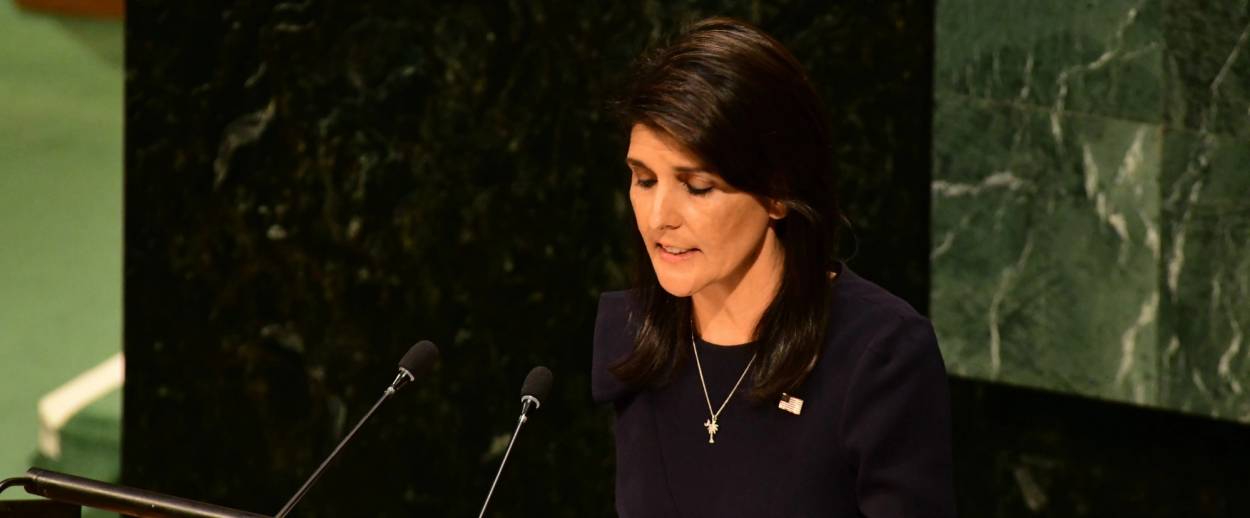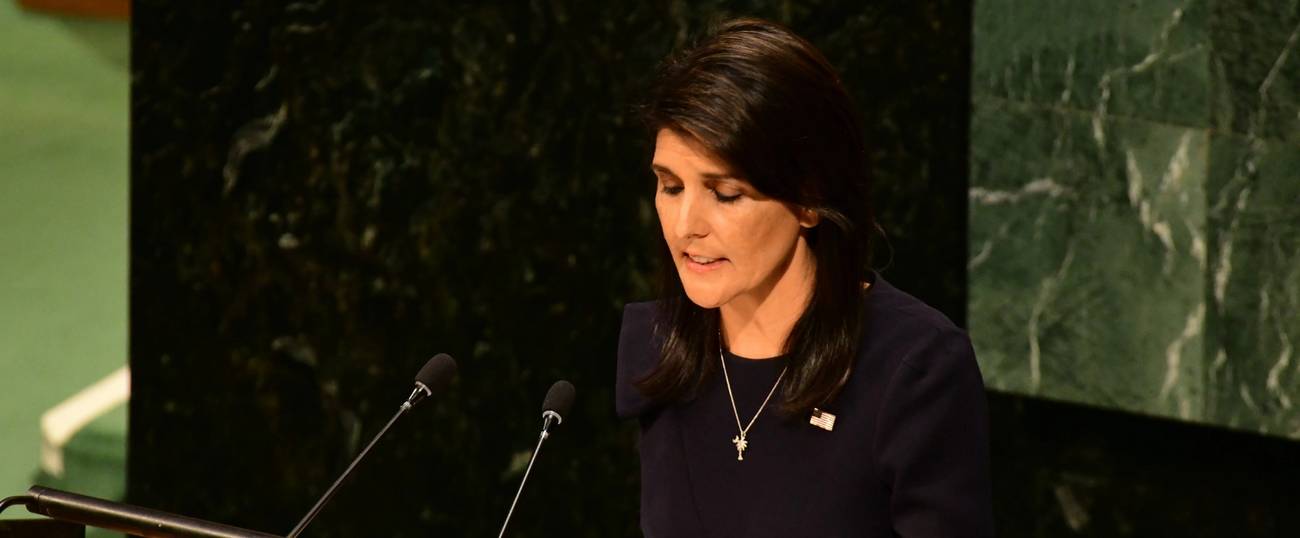Bipartisan Congressional Letter Questions Nikki Haley’s Stance on Hamas
The ongoing debate over Qatar has drawn the UN ambassador into unexpected territory




No member of Donald Trump’s presidential administration is more beloved among supporters of Israel than United Nations ambassador Nikki Haley. But thanks to the vicissitudes of Middle Eastern politics and a possible split within Trump’s White House, Haley has now been publicly criticized by members of Congress for equivocating on a major issue related to Israel’s security.
Late week, eight Congressmen—four Republicans and four Democrats—sent a letter to the UN ambassador asking her to clarify a written statement submitted to Congress in late October in which she claimed that the wealthy Gulf kingdom of Qatar “does not fund Hamas,” the Palestinian Islamist militant group.
“While the Qatari government does not fund Hamas, it does allow Hamas political representatives to be based in Qatar, which Qatar believes limits Iran’s influence and pressure over Hamas,” Haley wrote in a memo that Buzzfeed obtained last month. The statement reversed a number of Haley’s own claims about Qatari financing for Hamas from earlier in the year, and appears to contradict a 2014 Treasury Department determination on Hamas’s funding sources. More importantly, Haley’s written testimony seemed to imply a difference between Hamas’s political and military wings that US policy doesn’t typically recognize.
“We are writing with deep concern over U.S. policy towards Hamas and your recent statement regarding Qatar-based support for Hamas,” last week’s letter begins, before noting that “Since 2011, Qatar has hosted Senior Hamas terrorist leaders.” The letter alleges that Haley’s statement “implies the U.S. now recognizes a distinction between Hamas political and military wings and finds Qatar’s relations with and sanctuary for Hamas officials to be legitimate, which would be a change in US policy. Can you reassure us that the administration does not recognize a distinction between Hamas political and military wings?” The US mission to the UN hasn’t responded to the Congressional letter yet, since as of Monday they had not officially received it yet.
Haley’s October statement seems out of step with previous US policy in several respects. “Under successive administrations, under different leaders who were running Treasury’s office of Terrorism and Financial Intelligence, including during the Obama administration, we heard assessments that Qatar was involved heavily in Hamas finance,” said Jonathan Schanzer, a former Treasury Department official and vice president of research at the Foundation for Defense of Democracies. “We certainly haven’t seen any significant public shift on the part of the Qatari government” that would change that assessment, Schanzer added. He also noted that there usually isn’t a hierarchy of support for terrorism under US policy: Sheltering an organization’s leaders, directly financing a group, or in any way subsidizing terrorist activities is treated as equally legitimate. “The distinction between material support and financial support is not one that that government of the United States often makes,” said Schanzer.
Last week’s letter only has eight signatories, but its lead author, Robert Pittinger of North Carolina, is a Republican, and its signers include Josh Gottheimer, a staunchly pro-Israel New Jersey Democrat, and Don Bacon, a Nebraska Republican and former Air Force Brigadier General. The fact that Haley is the target of organized Congressional criticism for shielding an alleged state funder of Hamas from scrutiny is a strange and a revealing fact on its own. Haley is a pro-Israel icon. As South Carolina’s governor, Haley signed the country’s first anti-BDS bill into law, and as UN ambassador she’s overseen the US’s departure from UNESCO and gone on the rhetorical offensive against the institution’s alleged anti-Israel biases. At AIPAC’s annual Policy Conference last spring, Haley elicited the biggest cheers of the week, bringing an arena of 18,000 activists to their feet and leaving little doubt as to who the pro-Israel community’s consensus figure would be within Trump’s highly polarizing administration.
But the ongoing debate over Qatar has drawn the UN ambassador into unexpected territory. In early June, Saudi Arabia, the United Arab Emirates, and Bahrain abruptly cut off diplomatic relations with Qatar and imposed an air and land embargo on the country, partly over the kingdom’s alleged closeness with Iran and active support for the Muslim Brotherhood and affiliated groups, which are ideologically opposed to the existence of the Gulf monarchies.
Within the Trump administration, Secretary of State Rex Tillerson is seen as protective of Qatar and eager for an even-handed negotiated resolution to the standoff. Haley is thought to be in the anti-Tillerson camp, both because her pro-Israel bona views are likely to make her suspicious of an alleged state funder of Hamas, and because of her reported history of friction with the Secretary of State (“Rex hates her,” one official told the New Yorker’s Dexter Filkins of Tillerson’s relationship with Haley. “He fucking hates her.”). It’s widely believed that Haley’s October statement was written by the State Department, which demanded she go on-record reversing her earlier claims about Qatari financing for Hamas.
Haley’s back-tracking from October could show that the more pro-Qatar side of the administration is winning out—or it could show that the Trump administration still hasn’t formulated a coherent policy towards the country or the Gulf standoff in general. In any case, the administration clearly doesn’t want to give an impression that it’s pursuing contradictory policies on an matter as delicate as this one. When reached for comment on last week’s letter, a spokesperson for the US’s UN mission wrote, ”The whole U.S. government is united on this issue. We’re working hard to support [Gulf Cooperation Council] unity, which is critical for stability in the region. At the same time, we encourage countries to take more steps toward fighting terrorism.”
Republicans suspicious of Qatar still see Haley’s comments as an opening to move their side of the debate forward.
“Nikki Haley actually made a distinction and talked about Hamas’s political leadership,” said one Republican operative who works in foreign policy. “Obama didn’t even do that.” The operative fretted that the “US administration is running interference across multiple departments and cabinet secretaries—and that includes Nikki Haley—on behalf of Iran’s most important ally in the world, Qatar.”
Rich Goldberg, a Republican foreign policy strategist and former senior senate aid, said that in his view Haley has been “stellar in support of Israel at the UN to date,” and said her tenure as ambassador has been “a breath of fresh air.” “That’s why this prepared statement that really sort of represented a 180 in US policy towards Hamas was startling for a lot of people,” he said. “Making sure there’s some pushback and some accountability, giving her a chance to clarify and reverse what was written for her by the State Department, is probably a good idea.”
On Monday, Breitbart reported on the existence of the Congressional letter (which Tablet obtained late last week), under the headline, “Lawmakers hit Nikki Haley for Whitewashing Qatar’s Support for Hamas.” The Breitbart article referred to a speech at the Hudson Institute in which Steve Bannon, Breitbart’s CEO and a former top-level Trump advisor, slammed Qatar “for the continual funding for the Muslim Brotherhood, continual funding for Hamas.” Given Bannon’s former closeness with Trump and reported hands-on control of Breitbart’s content, it’s notable that the website is using Qatar to dial up pressure on a leading foreign policy figure in the Trump administration.
Haley’s reversal, and the letter this past week, is just the latest sign that Qatar is becoming a source of tension between the White House and Capitol Hill. In July, Tillerson announced that the US had reached a memorandum of understanding with Doha on measures aimed at curbing terrorism financing—but the entire MoU was immediately classified, a highly unusual move for a document of its type. Members of Congress can only view the MoU by traveling to the State Department’s headquarters in Foggy Bottom, and staffers without security clearances are blocked from viewing it entirely. In a Nov. 8 hearing of the House Financial Services Subcommittee on Terrorism and Illicit Finance, Pittinger, the lead author of last week’s letter, wondered why the MoU was classified in a way that made it so difficult for members of Congress and their staff to read. “Why this document is classified is at this point unclear to me,” said Pittinger. “There’s nothing sensitive that I’ve read in it that would justify highly classified information, as there’s very little there in terms of specifics. But it did strike me as limited in a number of key ways.” Others familiar with the MoU’s contents agree that there’s nothing in it that’s all that controversial. Still, this only that Washington and Doha don’t want public scrutiny of their various counter-terror arrangements, regardless of their actual substance.
Like Haley’s reversal, the MoU’s classification serves a clear diplomatic purpose. Actively alienating Qatar could make it harder for the US to broker an end to the now-five-month-long Gulf crisis, and the country hosts the headquarters of the US Air Force’s Central Command in the Middle East. Perhaps a degree of secrecy and accommodation is needed to weather the Gulf standoff while keeping Qatar as an ally and counter-terror partner, however flawed.
But that’s not the way some members of Congress sees things, and the administration’s stance towards Qatar has already had some strange and unexpected consequences.
Armin Rosen is a staff writer for Tablet Magazine.